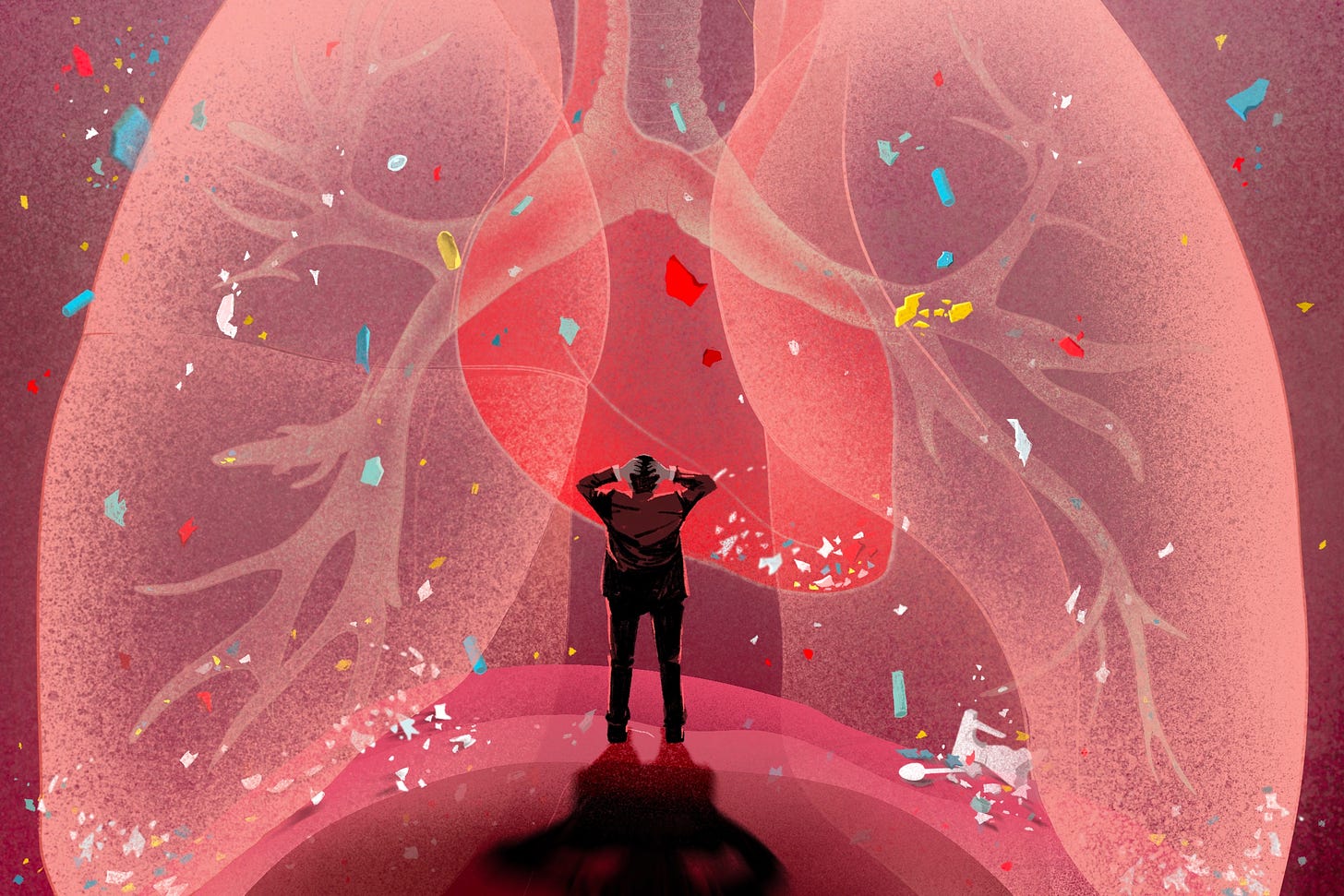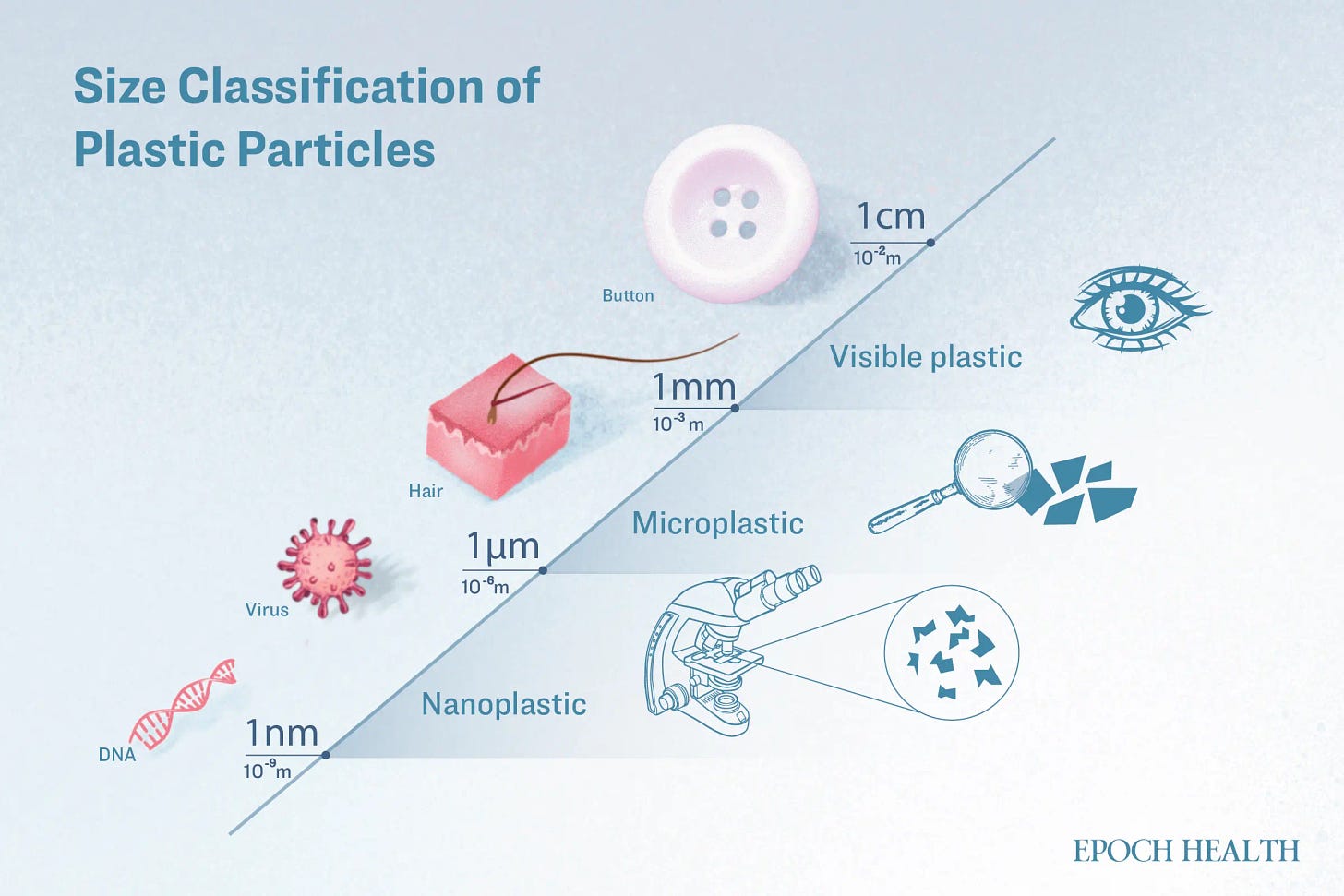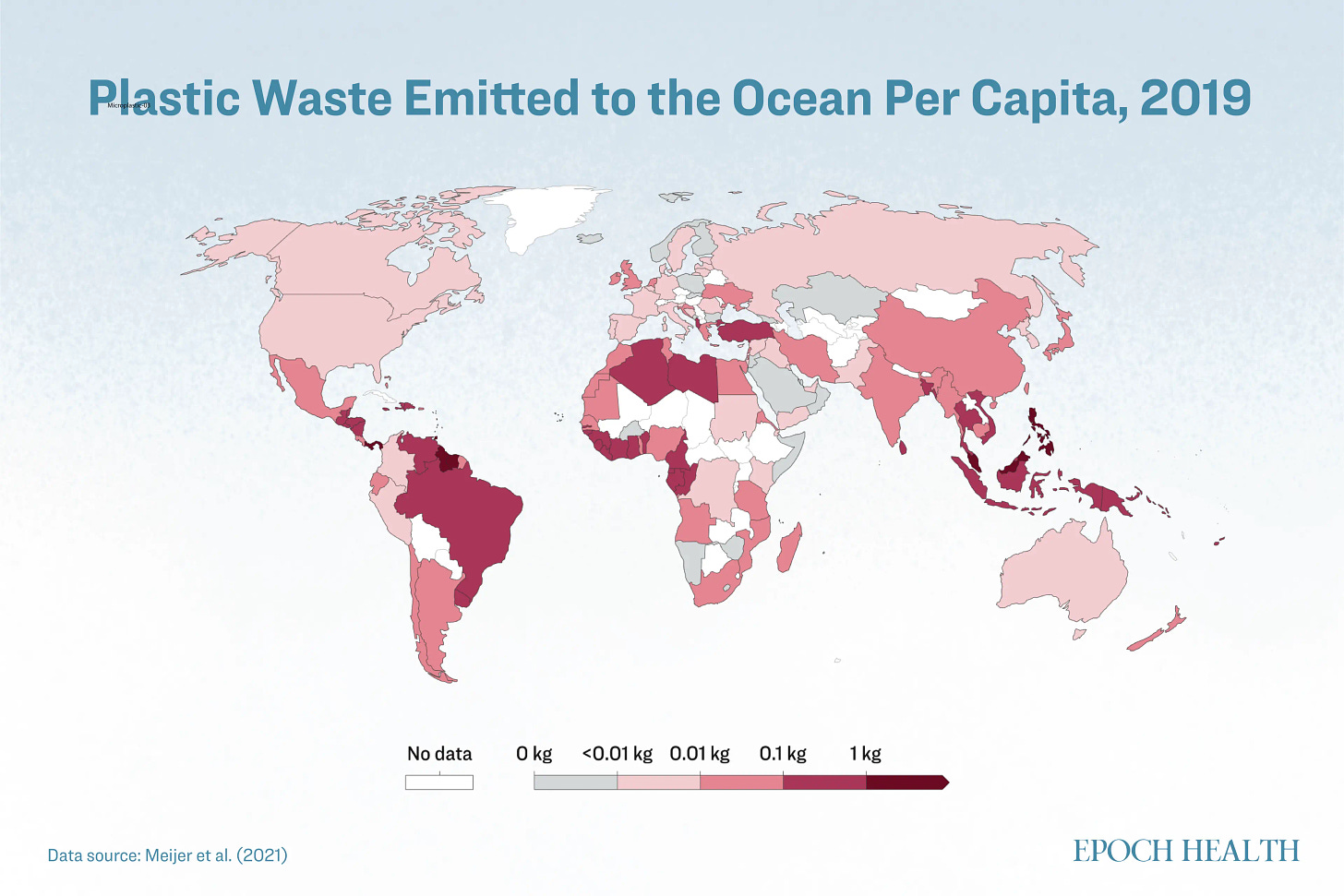What Can Be Done to Prevent DNA-Sized Plastics From Invading Our Bodies?
Amid debates on a global treaty to end plastic pollution, mounting research reveals risks to human health and an urgent need for solutions.
By Amy Denney
Plastics that break down into particles as tiny as our DNA—small enough to be absorbed through our skin—are released into our environment at a rate of 82 million metric tons a year. These plastics, and the mix of chemicals they are made with, are now major contributors to disease, affecting the risk of afflictions ranging from cancer to hormonal issues.
Plastic pollution threatens everything from sea animals to human beings, a problem scientists, activists, business groups, and politicians are debating as they draft a global treaty to end plastic pollution. These negotiations have only highlighted the complexity of a threat that seems to pit economic growth and jobs against catastrophic damage to people and the planet.
Rapid growth in plastics didn’t begin until the 1950s, and since then, annual production has increased nearly 230-fold, according to two data sets processed by Our World in Data. More than 20 percent of plastic waste is mismanaged—ending up in our air, water, and soil.
Inescapable Problem
While plastic doesn’t biodegrade—at least not in a reasonable time frame—it does break down into ever smaller particles. We may no longer see it, but plastic constantly accumulates in our environment. These microscopic bits, known as microplastics and nanoplastics, can enter our bodies through what we eat, drink, and breathe.
Microplastics measure five millimeters or less. Nanoplastics are an invisible fraction of that size, down to one billionth of a meter or around the size of DNA.
Plastic pollution is a chemical remnant of petroleum with other chemicals added in to change the durability, elasticity, and color. PlastChem Project has cataloged more than 16,000 chemicals—4,200 considered highly hazardous, according to the initiative’s report issued in March.
The astounding level and types of plastics, many with unknown health effects, should be a wakeup call for everyone, Erin Smith, vice president and head of plastic waste and business at the World Wildlife Fund (WWF), told The Epoch Times.
“Plastic pollution is absolutely everywhere,” she said. “What’s hard right now is the body of science, trying to understand what the presence of plastic inside us means from a human health perspective, is still new.”
Ms. Smith said we may be waiting for the science to reveal the full scope of plastic’s biological effects, but one thing is certain: “We know it’s not good.”
Reproductive and Neurological Issues
Newer human health studies have shown plastic has far-reaching effects.
“The research is clear: Plastics cause disease, disability, and death. They cause premature birth, low birth weight, and stillbirth as well as leukemia, lymphoma, brain cancer, liver cancer, heart disease and stroke. Infants, children, pregnant women, and plastics workers are the people at greatest risk of these harms. These diseases result in annual economic costs of $1.2 trillion,” said Dr. Phil Landrigan, pediatrician and environmental health expert, in a Beyond Plastics news release in March.
Beyond Plastics, an advocacy group for policy change, warns that new research indicates plastic could be leading to an increased risk of heart disease, stroke, and death.
Successive studies have found microscopic plastic particles affect every system of our bodies and at every age.
Nearly 3,600 studies indexed by the Minderoo Foundation have detailed the effects of polymers and additives like plasticizers, flame retardants, bisphenols, and per- and polyfluoroalkyl substances. The vast majority of studies indicate plastics affect endocrine and metabolic function, the reproductive system, and contribute to mental, behavioral, and neurodevelopment issues.
One study published in Environmental Science & Technology looked at plastic food packaging from five countries and found hormone-disrupting chemicals were common.
“The prevalence of estrogenic compounds in plastics raises health concerns due to their potential to disrupt the endocrine system, which can, among others, result in developmental and reproductive issues, and an elevated risk of hormone-related cancers, such as breast and prostate cancer,” the authors noted.
The full scope of these chemical consequences is far from known. According to Minderoo, less than 30 percent of more than 1,500 plastics chemicals have been investigated for human health impacts. That includes the “substitution” chemicals used to replace additives that were restricted after being found problematic.
“All new plastic chemicals should be tested for safety before being introduced in consumer products, with ongoing post-introduction monitoring of their levels in human biospecimens and evaluation of health effects throughout the lives of individuals and across generations,” said professor Sarah Dunlop, Minderoo Foundation’s head of plastics and human health.
Go paid at the $5 a month level, and we will send you both the PDF and e-Pub versions of “Government” - The Biggest Scam in History… Exposed! and a coupon code for 10% off anything in the Government-Scam.com/Store.
Go paid at the $50 a year level, and we will send you a free paperback edition of Etienne’s book “Government” - The Biggest Scam in History… Exposed! OR a 64GB Liberator flash drive if you live in the US. If you are international, we will give you a $10 credit towards shipping if you agree to pay the remainder.
Support us at the $250 Founding Member Level and get a signed high-resolution hardcover of “Government” + Liberator flash drive + Larken Rose’s The Most Dangerous Superstition + Art of Liberty Foundation Stickers delivered anywhere in the world. Our only option for signed copies besides catching Etienne @ an event.










The solutions are so blatantly obvious yet they are always overlooked by "science". It is science that gave us these problems and now we're looking to the same vandals to get us out of it? You know the problem is we look outside of ourselves to get us out of it. We are all to blame for this current situation - we could have said something by now, it's been known for decades. Same with fluoridation in the water and countless other poisons (chemtrails for an obvious other one) But nothing is said, nobody wants to talk about it. The solution is simple - rapidly renewable plants such as hemp, kenaf, bamboo and countless others. Hemp particularly as it also cleans the soil and can be made into thousands of helpful products. We need to start a hemp economy NOW. First we must talk about it and work things out but we must do it ourselves and not look to institutions to wipe our butts. Most people could grow hemp. We need to make processing plants and we could convert many buildings for this use (casinos would be a good place to start!) Our money can be based on true value - the value of a volume of hemp which would make our economy stable. Science is a religion, it doesn't serve us, we need to discard it and start all over.